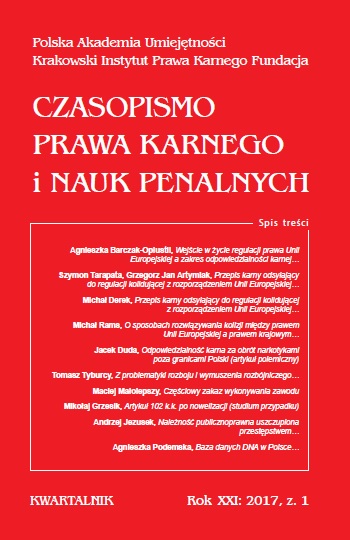Z problematyki rozboju i wymuszenia rozbójniczego
(właściwy czy niewłaściwy zbieg art. 280 i 282 k.k.?)
On the issues of robbery and theft by extortion (regular or irregular concurrence between Art. 280 and 282 of Polish Criminal Code?)
Author(s): Tomasz TubrycySubject(s): Criminal Law
Published by: Polska Akademia Umiejętności / Krakowski Instytut Prawa Karnego Fundacja
Keywords: larceny; theft by extortion; concurrence of provisions; robbery
Summary/Abstract: Prawie powszechnie przyjmuje się, że w przypadku przestępstwa wymuszenia rozbójniczego (art. 282 k.k.) mienie nie przechodzi w posiadanie sprawcy natychmiast, jak ma to miejsce przy rozboju (art. 280 k.k.). W ten sposób rozróżnia się oba te przestępstwa. Sprawca wymuszenia rozbójniczego obejmuje mienie w posiadanie w przyszłości i przez to pokrzywdzony ma możliwość uratowania mienia poprzez zawiadomienie organów ścigania. W artykule zaprezentowano trzy koncepcje rozumienia znaczenia przesłanki „natychmiastowości”. Wydaje się, że znamiona rozboju i wymuszenia rozbójniczego krzyżują się ze sobą. Alternatywnym sposobem odróżnienia obu przestępstw jest uznanie, że zmuszenie do wydania rzeczy ruchomej natychmiast nie wypełnia znamion rozboju, lecz wymuszenia rozbójniczego. Porównywane typy czynów zabronionych różnią się stroną podmiotową (celem działania). Sprawca rozboju działa w celu przywłaszczenia rzeczy ruchomej. Natomiast sprawca wymuszenia rozbójniczego działa w celu osiągnięcia korzyści majątkowej. It is almost universally accepted that in case of the crime of theft by extortion (Art. 282 k.k.) the property in question is not immediately transferred into possession of the offender, as it is in the case with the crime of robbery. In fact, this is the way of distinguishing between those two crimes. Because of the fact that the perpetrator of the theft by extortion will enter into possession of a property not immediately but only after conducting of prohibited act, the harmed party has the possibility of saving the property by notifying the law enforcement organs. Three concepts of understanding the meaning of premise of “immediacy” are presented in the article. It seems that the elements of both crimes – robbery and theft by extortion – are intersecting each other. An alternative way to distinguish between those two crimes is to recognize that forcing someone to immediately dispose of property does not constitute the elements of robbery, but the theft by extortion. Types of prohibited acts in comparison here have different subjective elements (the purpose of action undertaken by perpetrator). The perpetrator of robbery acts with the purpose of appropriating someone else’s movable item, while the perpetrator of theft by extortion acts with purpose of gaining a material benefit.
Journal: Czasopismo Prawa Karnego i Nauk Penalnych
- Issue Year: 21/2017
- Issue No: 1
- Page Range: 97-110
- Page Count: 14
- Language: Polish

